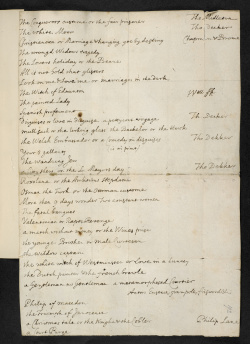Christianetta, or Marriage and Hanging Go by Destiny
Richard Brome and ? George Chapman (c.1623-1640)
Historical Records
Stationers' Register
Entered by Andrew Crooke, 4 August 1640:
- six Playes vizt, Christianetta. The Iewish gentleman. A new Academy or Exchange. The love sick Cort. The Covent Garden. and The English Moore or mock Marriage by Mr. Rich: Broome.
(Bentley, 3.58)
Hill's list
Hill's list is reproduced and discussed here. The third item on it is:
- Christianetta or Marriage & hanging goe by destiny Chapman & Brome
Theatrical Provenance
Unknown
Probable Genre(s)
Comedy? (Harbage)
Possible Narrative and Dramatic Sources or Analogues
None known
References to the Play
None known
Critical Commentary
Hill's List of Early Plays in Manuscript appears to indicate that this play was a collaboration between Brome and George Chapman. If this is true, it must have preceded Chapman's death in 1634, and Harbage accordingly dates it to 1633 or earlier. Bentley (3.59) argues for a date much earlier than this, connecting it with the record of the lost play A Fault in Friendship:
- The title sounds rather like those Herbert was licensing for the Fortune and Red Bull companies in 1623 and 1624, when Brome collaborated with young Johnson on A Fault in Friendship for the Prince's Company, probably at the Red Bull. Accordingly I should like to guess at the date at some time in the twenties before Brome began writing for the King's Men. This is sheer unsupported conjecture.
The earliest certain record for a Brome play, otherwise, is 1629, the date of the lost The Lovesick Maid, or Honor of Young Ladies, so this is an extremely early date. Catherine M. Shaw, though, raises the possibility that at some point in the 1630s Brome revised an earlier Chapman play and in 1640 claimed it for his own. As a result, she offers two conjectural dates: 1623, and 1634. (Shaw, 13-14, 108).
For What It's Worth
Three of the other five plays on the Stationers' Register list (The English Moor, The Love-Sick Court, and The New Academy) belong to the period of Brome's tenure as chief dramatist to the Prince's Men/Queen Henrietta's Men (1635-9); but one is certainly earlier (The Weeding of Covent Garden), and the date of the fifth (the lost The Jewish Gentleman) is unknown. Thus, the Stationers' Register record is of little use as dating evidence. What's more, it is not categorically certain that Richard Brome was in fact the author of the lost play A Fault in Friendship (q.v.).
"Marriage and hanging go by destiny" is a common seventeenth-century proverb. EEBO-TCP suggests that it is often, but not exclusively, used in jocular allusion to marriages which have turned out to be unhappy. "Christianetta", interestingly, is currently altogether unknown to EEBO-TCP, and still awaits elucidation.
Works Cited
- Shaw, Catherine M. Richard Brome. Boston: Twayne, 1980.
Site created and maintained by Matthew Steggle. Updated 2 December 2009.
